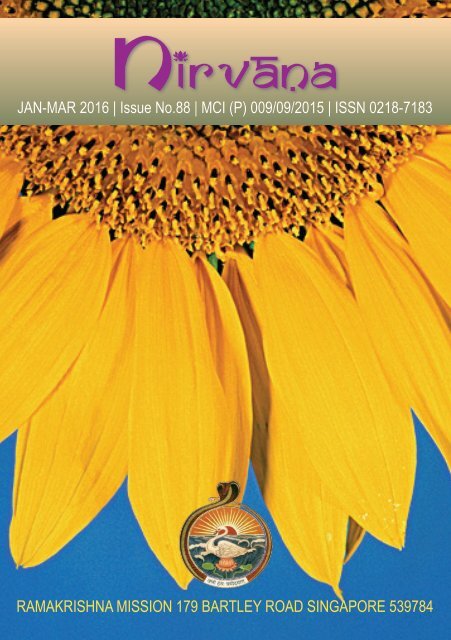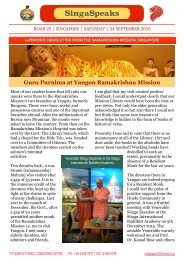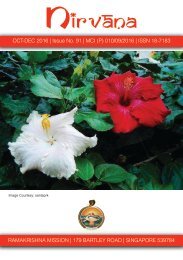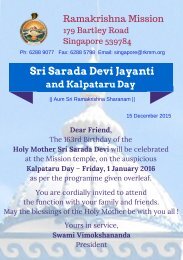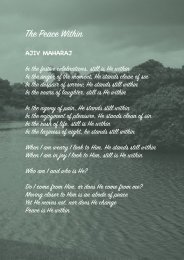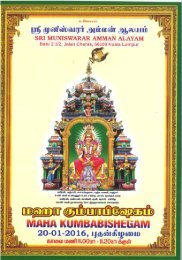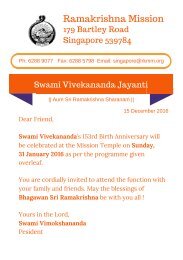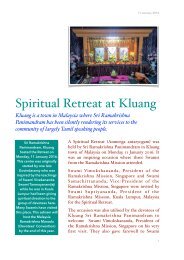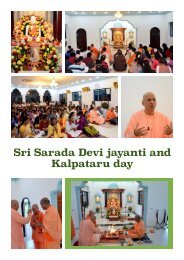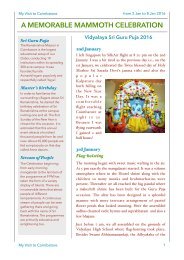Nirvana 2016 Issue 88 (Jan-Mar)
Nirvana ----------------------------- State of spiritual enlightenment or illumination is called NIRVANA. The Singapore Ramakrishna Mission brings out a quarterly spiritual magazine by the name NIRVANA. The present issue is dated Jan-March 2016 and has 28 Pages. A special centre-spread narrates about Holy Mother Sri Sarada Devi. An article on Thai Pusam by +Yogan Naidoo is an added attraction. Plenty of News & Notes about the multifarious activities of the Centre are also included. Please go through this magazine and provide feedback, if any.
Nirvana
-----------------------------
State of spiritual enlightenment or illumination is called NIRVANA. The Singapore Ramakrishna Mission brings out a quarterly spiritual magazine by the name NIRVANA. The present issue is dated Jan-March 2016 and has 28 Pages. A special centre-spread narrates about Holy Mother Sri Sarada Devi. An article on Thai Pusam by +Yogan Naidoo is an added attraction. Plenty of News & Notes about the multifarious activities of the Centre are also included. Please go through this magazine and provide feedback, if any.
Create successful ePaper yourself
Turn your PDF publications into a flip-book with our unique Google optimized e-Paper software.
JAN-MAR <strong>2016</strong> | <strong>Issue</strong> No.<strong>88</strong> | MCI (P) 009/09/2015 | ISSN 0218-7183<br />
RAMAKRISHNA MISSION 179 BARTLEY ROAD SINGAPORE 539784
State of Spiritual enlightenment or illumination. <strong>Nirvana</strong> releases humans from<br />
the cycle of birth, suffering, death and all forms of worldly bondage.<br />
In this issue...<br />
Pearls of Wisdom 1<br />
from Uddhava Gita<br />
Editorial 2<br />
The Rich man & the Sadhu 3<br />
William Page<br />
Cultivation of Strength and Fearlessness 8<br />
Swami Budhananda<br />
Mother's Melting Moments 12<br />
Swami Apurvananda<br />
Thai Pusam Festival 15<br />
Yogan Naidoo<br />
News & Notes 20<br />
Edited and Published by Swami Muktirupananda, Vimokshananda, President, Ramakrishna Mission,<br />
179 Bartley Road, Singapore 539784 Tel: 62<strong>88</strong> 9077 Fax: 62<strong>88</strong> 5798.<br />
email: office@ramakrishna.org.sg, Website: www.ramakrishna.org.sg<br />
Print Production: EAZI Printing Pte Ltd
Pearls of<br />
Wisdom<br />
Uddhava Gita<br />
Translated by Swami Madhavananda<br />
Śrī bhagavān uvāca<br />
The Lord said:<br />
Earth, Water, fire, air and ether are the five common factors<br />
of the bodies of all beings from Brahma down to a<br />
tree etc., and they are equally connected with a soul.<br />
O Uddhava, though their bodies are thus similar, yet for<br />
their own good the Vedas have fashioned diverse names<br />
and and forms for them.<br />
O best of men, with a view to circumscribing work I enjoin<br />
merits and defects regarding things in accordance with<br />
the exigencies of place, time, etc.<br />
Of lands those that are devoid of spotted antelopes and<br />
and where, in particular, devotion to Brahmanas is absent,<br />
should be considered impure. And even if they are rich in<br />
antilopes tracts designated as Kikata and those that are<br />
not swept, or are barren, should be regarded as impure<br />
unless there be worthy people in them.<br />
(To be continued) Uddhava Gita 16 (5 - 8)<br />
1
President's Page<br />
Welcome, <strong>2016</strong>!<br />
Just a minute ago, 2015 was given a go-bye, sorry 'Durga,<br />
Durga' in our parlance! And in comes a beaming <strong>2016</strong>. A very<br />
happy, hearty New Year Day aka Kalpataru Day to every<br />
one of you!<br />
The past year 2015 was indeed a memorable year. Singapore<br />
celebrated its Golden Jubilee. During the year-long functions<br />
here I was posted as President of our Mission centre and<br />
reached in Jun e.<br />
“How was your life in the bygone year?” a question I usually<br />
put to our devotees. Some would hesitantly reply, “Don’t ask,<br />
Maharaj! It was not at all encouraging!”<br />
So, adverse circumstances were aplenty? Never mind.<br />
Think what Swamiji says about Life. He defines Life as “the<br />
unfoldment and development of a being under circumstances<br />
tending to press it down.” If you had had problems gal ore that<br />
were ‘pressing’ you ‘down’, thank God, because those were the<br />
best opportunities for unfoldment and development. Life is<br />
nothing but a process of Learning. Situations are indeed<br />
windowless, doorless and even wall-less schools. A wealth of<br />
knowledge has already been accumulated through our<br />
experiences. Tirukkural asks, "kattRadanAl Aya payan en kol<br />
vAlaRivannattRAl thozhAr enin?” (I.1.2)<br />
Of what avail is the Learning if divine feet of Him who<br />
possesses perfect wisdom are not worshipped?<br />
So, God-centered Life is what we require in this New Year.<br />
Once a goal is set up, it becomes easy to navigate the course of<br />
life. Did not the Master say on the 1st <strong>Jan</strong>uary of 1<strong>88</strong>6, “May<br />
your spiritual consciousness be awakened!”? May the New Year<br />
‘gift’ us in abundance further opportunities in the<br />
‘manifesta tion of Divinity already within’ us!<br />
Swami Vimokshananda<br />
12:01 am <strong>Jan</strong>uary 1, <strong>2016</strong><br />
2
The Rich Man and the Sadhu<br />
William Page<br />
I<br />
heard this story many years<br />
ago from an Indian travelling<br />
companion in Himachal<br />
Pradesh. I don’t know how widely<br />
known it is, but readers of <strong>Nirvana</strong><br />
may find it interesting. I’ve added<br />
a few rhetorical flourishes.<br />
Once Lord Krishna and Prince<br />
Arjuna were traveling through a<br />
vast wilderness. They had been<br />
walking all day beneath a blazing<br />
sun. They were tired, hungry, and<br />
thirsty.<br />
Suddenly they came to a huge<br />
mansion looming up out of<br />
nowhere. It was surrounded by a<br />
wall, and there were armed guards<br />
at the entrance. Behind it, Krishna<br />
and Arjuna could see green fields<br />
lush with crops, and rich pastures<br />
full of cattle.<br />
“This looks good, Lord,” Arjuna<br />
said. “Maybe here we can get<br />
something to eat.”<br />
Krishna nodded in assent, and<br />
Arjuna approached one of the<br />
guards. “Greetings,” he said. “We<br />
are Krishna and Arjuna. We’ve<br />
been walking all day, and would<br />
be grateful if you could kindly ask<br />
your master if we could please<br />
have a bite to eat, a drop to drink,<br />
and a corner to rest our weary<br />
heads.”<br />
The guard went inside to convey<br />
this message, and soon the chief<br />
steward approached the owner of<br />
the mansion.<br />
The Rich Man<br />
The owner’s name was Dhan<br />
Babu. He was fabulously wealthy<br />
and enormously fat, rivaling Jabba<br />
the Hutt in gross obesity. He lay<br />
on a sofa like a giant jellyfish, clad<br />
in silks and satins, wearing gold<br />
rings and bracelets, swilling down<br />
rich viands from a huge table<br />
groaning beneath a banquet of<br />
sumptuous delicacies. A troupe of<br />
voluptuous dancing girls writhed<br />
and swayed before him as a string<br />
quartet played erotic music. In the<br />
background, magicians performed<br />
tricks, clowns tumbled, and<br />
jugglers juggled.<br />
The steward bowed and<br />
announced, “Master, two travelers<br />
are outside. They say their names<br />
are Krishna and Arjuna. They’ve<br />
been walking all day and crave<br />
your gracious hospitality. A bite to<br />
eat, a drop to drink, and a humble<br />
corner to sleep in is all they ask.”<br />
Dhan Babu chewed another<br />
mouthful of sauteed hummingbird<br />
tongues and slobbered on his<br />
silken shirt. “Krishna and Arjuna!”<br />
he squealed with his mouth still<br />
full, spitting hummingbird tongues<br />
3
all over the table. “I know those<br />
two! They’re scoundrels, rascals!<br />
Don’t give them anything! Not a<br />
crumb to eat, not a drop to drink,<br />
not a single square inch on which<br />
to lay their verminous heads!<br />
Come here to beg, have they?<br />
Ha! Tell them to get off my<br />
property! Right now! If they<br />
refuse to go, beat them with your<br />
shoes!” His beady little pig’s eyes<br />
glowered in the flabby folds of his<br />
porcine face as he gobbled down<br />
a bowlful of caviar and uttered a<br />
stentorian belch.<br />
The steward bowed and returned<br />
to the front gate. “Sorry,<br />
gentlemen,” he announced to<br />
Krishna and Arjuna. “My master<br />
seems unfavorably disposed<br />
towards you. He won’t allow us to<br />
give you any food and water,<br />
much less a place to sleep. He<br />
called you several bad names and<br />
orders you to get off his property<br />
immediately. If you don’t obey,<br />
we’re supposed to beat you with<br />
our shoes. Sorry about all this.”<br />
Arjuna’s face fell, but Krishna, as<br />
always, looked serene. “Thank<br />
you for trying,” he told the guard.<br />
“Come, Arjuna, let us depart.”<br />
They continued on their way, but<br />
Arjuna’s face was dark with anger<br />
as he brooded on the rude rebuff<br />
they had received.<br />
By now it was starting to get dark,<br />
and they came to a riverbank.<br />
There they saw a shabby structure<br />
that hardly deserved to be called a<br />
hut. It was little more than a<br />
framework of bamboo poles with a<br />
few banana leaves attached.<br />
The Sadhu<br />
In front of the hut, a skinny old<br />
man sat on a worn mat,<br />
meditating. Tied to the hut was an<br />
emaciated old cow, barely able to<br />
stand.<br />
As soon as Krishna and Arjuna<br />
approached, the old man leaped<br />
to his feet and uttered a cry of joy.<br />
“Lord Krishna! Prince Arjuna!” he<br />
cried. “I recognize you! Welcome!<br />
Welcome! Please honor my<br />
humble ashram by taking some<br />
food and drink! Oh, it is such an<br />
honor to have you here!”<br />
Arjuna looked around. Aside from<br />
the cow and the hut, there was<br />
nothing. “We don’t want to take<br />
your food, old man,” he said, “but<br />
if we could just have a piece of<br />
ground to sleep on…”<br />
“No! No!” the old man cried. “You<br />
are my guests! You must take<br />
some food! Oh, it will be such an<br />
honor! For Lord Krishna and<br />
Prince Arjuna to grace my humble<br />
ashram with their presence—oh,<br />
it’s more than I’ve ever dreamed<br />
of! Please sit down!”<br />
He hobbled into the hut, dug out<br />
two worn mats from somewhere,<br />
4
ought them outside, and placed<br />
them on the ground. Somewhat<br />
embarrassed, Krishna and Arjuna<br />
sat down.<br />
The old man scurried back into the<br />
hut and rummaged around in the<br />
rear. He came out with a few stale<br />
chapattis and some old cheese on<br />
a cracked plate, and offered them<br />
to his guests. “It’s all I’ve got,” he<br />
quavered. “It’s not much, but it’s<br />
all I’ve got. Please eat.”<br />
“We really don’t want to take your<br />
food, old man,” Arjuna protested.<br />
“We are young and strong. You<br />
are old. You please eat the food.”<br />
He pushed the plate forward.<br />
“No! No!” the old man cried. “For<br />
Lord Krishna and Prince Arjuna to<br />
visit my ashram and go away<br />
hungry—unthinkable!<br />
Unthinkable!” He leaped to his<br />
feet, went back into the hut, came<br />
out with two battered tin cups, and<br />
ran down to the river to fill them<br />
with water.<br />
Krishna and Arjuna reluctantly<br />
nibbled at the food. When the old<br />
man came back with the two cups<br />
of water, they drank.<br />
“I’m sorry I don’t have any pickle<br />
to offer you,” the old man snuffled.<br />
“Devotion is the best pickle,”<br />
Krishna declared heartily, slapping<br />
Arjuna on the back. “Isn’t that<br />
right, Arjuna?”<br />
“Right, right,” muttered Arjuna.<br />
“Devotion is the best pickle.” He<br />
stared glumly down at his stale<br />
chapatti. A small beetle crawled<br />
out from inside it. Arjuna picked<br />
up the beetle, placed it gently on<br />
the ground, and examined the<br />
chapatti with extreme care before<br />
proceeding.<br />
“This is wonderful food,” Krishna<br />
enthused. “Cooked in nectar,<br />
topped with ambrosia, spiced with<br />
the pickle of devotion. Isn’t that<br />
right, Arjuna?”<br />
“Right,” agreed Arjuna. “Nectar<br />
and ambrosia, indeed. Nice pickle,<br />
too.”<br />
After they finished eating, Krishna<br />
inquired, “How long have you<br />
been practicing austerities,<br />
sadhuji?”<br />
“Forty years,” the old man sighed.<br />
“I was young when I started. But<br />
now…”<br />
“Any progress?” Krishna pursued.<br />
“Some,” the old man replied, “But<br />
so far, full realization has escaped<br />
me. I must have too many bad<br />
samskaras weighing me down.”<br />
Krishna fixed him with a<br />
penetrating gaze, appraising him.<br />
“Not too many,” he observed.<br />
“Keep at it.”<br />
The old man prepared a bed of<br />
rushes on the ground and insisted<br />
that Krishna and Arjuna sleep on<br />
it. He would sleep on the bare<br />
ground. Again they protested, but<br />
to no avail.<br />
5
The next morning Krishna and<br />
Arjuna prepared to resume their<br />
journey. There was nothing left to<br />
eat, but the old man milked the<br />
cow, so at least they had a little<br />
milk for breakfast. “Please bless<br />
me before you go,” the old man<br />
begged.<br />
“Of course I bless you, sadhuji,”<br />
Krishna replied, embracing him<br />
tenderly. He kissed the old man<br />
on the forehead, then raised his<br />
hands in blessing as the old man<br />
bowed. “May your prayers be<br />
fruitful. May your japa be fruitful.<br />
May your meditation be fruitful.<br />
May all your spiritual striving be<br />
fruitful. May the All-Loving Being<br />
illumine you, now and<br />
forevermore.”<br />
Then Krishna and Arjuna took<br />
their leave.<br />
They walked along the riverbank,<br />
Krishna humming a little tune and<br />
Arjuna looking pensive. Finally<br />
Arjuna spoke. “Lord,” he said.<br />
“Speak,” Krishna replied.<br />
“Don’t you think you ought to<br />
reward that old man for his<br />
hospitality?”<br />
“Of course,” Krishna replied.<br />
“And don’t you think you ought to<br />
punish that rich landowner for his<br />
stinginess? For insulting us and<br />
driving us away?”<br />
“Most definitely,” Krishna agreed.<br />
“Then? Then? What are you<br />
going to do?”<br />
Krishna paused, as if in reflection.<br />
Then he said, “I’m way ahead of<br />
you, Arjuna. Events have already<br />
been set in motion.”<br />
“Oh, good,” Arjuna said. “So<br />
what’s going to happen?”<br />
Playback Time<br />
“First, as for the rich man,” Krishna<br />
began. “A distant relative is going<br />
to die—has just died now, in fact—<br />
and will leave him a great fortune.<br />
His wealth will triple. With it he’ll<br />
enlarge his mansion and add all<br />
sorts of new luxuries. He’ll hire<br />
more servants, buy more fields,<br />
plant more crops. He’ll buy more<br />
In the Shlokas beginning with<br />
तं तथा कृ पयाविष्टं , how<br />
poetically, how beautifully,<br />
has Arjuna's real position<br />
been painted! Then Shri<br />
Krishna advises Arjuna; and<br />
in the words क्लैब्यं मा स्म<br />
गमः पाथथ etc., why is he<br />
goading Arjuna to fight?<br />
Because it was not that the<br />
disinclination of Arjuna to<br />
fight arose out of the<br />
overwhelming predominance<br />
of pure Sattva Guna; it was all<br />
Tamas that brought on this<br />
unwillingness.<br />
-Swami Vivekananda<br />
6
pastures and double the number<br />
of his cows. He’ll expand his<br />
holdings till he owns half the<br />
province. He’ll become<br />
fantastically rich and powerful.<br />
That’s how I’m going to punish the<br />
rich man.”<br />
Arjuna stared at him, aghast.<br />
“Now, as for the old sadhu,”<br />
Krishna continued. “A storm will<br />
come—in fact, it’s brewing up right<br />
now. It will sweep away his<br />
miserable hut and blow it right into<br />
the river. A bolt of lightning will kill<br />
his cow. He’ll be left with nothing,<br />
sitting alone in the mud as the rain<br />
pours down.”<br />
Arjuna looked as if he were going<br />
to have a stroke. His face got red,<br />
his eyes bulged, and he gasped<br />
like a fish out of water. Finally he<br />
found his voice. “I—I can’t believe<br />
this!” he choked. “The rich man<br />
kicks us out and insults us, and<br />
you reward him by piling more<br />
wealth, power, and possessions<br />
on him? The poor old sadhu<br />
feeds us even though he has<br />
nothing, and you punish him by<br />
stripping away what little he has?<br />
Why?”<br />
Krishna sighed. “Arjuna, Arjuna,<br />
you are thinking like a worldly<br />
man. Let’s do a reality check.<br />
What is the summum bonum, the<br />
highest good, the goal of human<br />
life?” Arjuna thought. “To realize<br />
God, of course.”<br />
“That’s right,” Krishna said. “Now,<br />
just think a bit. That rich<br />
landowner was already<br />
enormously wealthy. His mind<br />
was tied up, entangled, fettered by<br />
a thousand luxuries and<br />
possessions. It would have taken<br />
him five hundred lifetimes just to<br />
start THINKING about realizing<br />
God.<br />
“Now I’m dumping three times as<br />
much wealth on him. His mind will<br />
get so weighed down by all the<br />
rubbish he’ll accumulate that he’ll<br />
NEVER get out from under it.<br />
Now it’ll take him five THOUSAND<br />
lifetimes just to start thinking about<br />
realizing God. That is my<br />
punishment.<br />
“The old sadhu, on the other hand,<br />
was poised right on the brink of<br />
enlightenment. He had only two<br />
things holding him back—his<br />
attachment to his hut and his<br />
attachment to his cow. Now I am<br />
breaking those attachments.<br />
Within the hour, enlightenment will<br />
strike, his mind will soar into<br />
samadhi, and he will merge into<br />
the unutterable bliss of the<br />
Absolute forever. That is my<br />
reward.<br />
“So before you question my<br />
rewards and my punishments,<br />
make sure you understand exactly<br />
what is a reward and what is a<br />
punishment,” thus Sri Krishna<br />
concluded.<br />
7
Cultivation of Strength and Fearlessness<br />
Swami Budhananda<br />
(Continued from the previous issue)<br />
N<br />
ow, where is the root of<br />
fear? According to<br />
Vedanta, the root of fear is<br />
in our ignorance of the true nature<br />
of the Self. Because we do not<br />
know that the core of being or the<br />
Atman is infinite, immortal and<br />
indestructible, we are afraid of<br />
death. And from our ignorance of<br />
the true nature of the Atman,<br />
which is one, indivisible,<br />
homogeneous consciousness<br />
arises the concept of otherness,<br />
that is, the sense of<br />
differentiation. From the sense of<br />
differentiation arise the ideas of<br />
competitive exclusive self--<br />
interest, and fears of various<br />
sorts.<br />
In the Upanishad it is taught: "If<br />
the aspirant makes the slightest<br />
differentiation in it, there is fear<br />
for him." Again says the<br />
Upanishad, emphasizing the<br />
same idea in another way: "It is<br />
only from the idea of the<br />
existence of a second one that<br />
fear arises."<br />
The cause of fear being so, its<br />
final solution is possible only<br />
through the realization of the true<br />
nature of the Self, which also<br />
means direct realization of the<br />
fact of the unity of existence.<br />
When we experientially know that<br />
"All this is verily Brahman" and<br />
that "This individual self is<br />
Brahman" then there remains<br />
none or nothing outside the Self.<br />
to be afraid of. In other words,<br />
true fearlessness cannot be<br />
attained except through the<br />
attainment of illumination.<br />
You know the old story of<br />
Alexander and the Hindu sage.<br />
Swami Vivekananda narrates this<br />
in one of his lectures: "An<br />
emperor who invaded India was<br />
told by his teacher to go and see<br />
some of the sages there. Alter a<br />
long search for one, he found a<br />
very old man sitting on a block of<br />
stone. The emperor talked with<br />
him a little and became very<br />
much impressed by his wisdom.<br />
He asked the sage to go to his<br />
country with him. "No," said the<br />
sage, "I am quite satisfied with my<br />
forest here." Said the emperor, I<br />
will give you money, position,<br />
wealth. I am the emperor of the<br />
world." "No;" replied the man, "I<br />
don't care for those things." The<br />
emperor replied, "If you do not go,<br />
I will kill you." The man smiled<br />
serenely and said, "That is the<br />
most foolish thing you ever said,<br />
1<br />
8
Emperor. You cannot kill me. Me<br />
the sun cannot dry, the heat<br />
cannot burn, the sword cannot<br />
kill, for I am the birthless, the<br />
deathless, the ever-living,<br />
omnipotent, omnipresent Spirit."<br />
Such fearlessness can spring<br />
only from attained illumination,<br />
when a man directly perceives<br />
that his being pervades the<br />
universe and that infinite strength<br />
and power are behind him. We<br />
may not know it but behind<br />
everyone of us is God's infinite<br />
power. We are conduits of his<br />
power. How can a gun be afraid<br />
of a bullet? Yet we are. That is<br />
maya. That is the tragedy. We<br />
must volatilize this illusion in order<br />
to become fearless. As human<br />
beings who are not yet illumined<br />
we of course cannot have the<br />
fearlessness of illumined souls.<br />
But this we can surely do: we can<br />
intellectually and emotionally<br />
make the ideas of immortality of<br />
the soul and the unity of<br />
existence our own by constantly<br />
thinking of them, and thus driving<br />
out of our minds all contrary<br />
ideas. When these ideas will sink<br />
into our subconscious, our<br />
tendencies will take shape<br />
accordingly and fear will gradually<br />
leave while courage takes over.<br />
Swami Vivekananda says that<br />
there are two sorts of courage:<br />
one is the courage of facing the<br />
cannon, and the other is the<br />
courage of spiritual conviction.<br />
One is the physical courage, and<br />
the other is the spiritual courage.<br />
We have discussed how spiritual<br />
courage may be attained. Let us<br />
take our stand on the spirit and<br />
dare to live its implications and<br />
spiritual courage will gradually<br />
flow forth within us.<br />
Courage to Conquor<br />
Meanwhile we are indeed more<br />
concerned with the attainment of<br />
physical courage. It is shameful, it<br />
is degrading, it is stupid to live in<br />
constant fear of one thing or other<br />
on the physical plane. The most<br />
effective method of cultivating<br />
fearlessness on the physical<br />
plane is to "face the brute!" This<br />
teaching comes to us from Swami<br />
Vivekananda's life. It so<br />
happened in his early youth,<br />
when one day he was returning<br />
from a temple of the Divine<br />
Mother in Varanasi, he was<br />
pursued by a troop of monkeys<br />
and so he was about to run<br />
fearing that they might attack him.<br />
Suddenly he heard the voice of<br />
an old sannyasin calling out to<br />
him. And what the old monk said<br />
became an object lesson for<br />
Vivekananda's whole life, and it<br />
should be an object lesson of our<br />
life too, if we want to be bold and<br />
fearless. The Sannyasin said,<br />
"Stop; always face the brutes!"<br />
2<br />
9
Vivekananda turned, his fear<br />
gone. Seeing him defiant, the<br />
brutes fled. In a lecture given in<br />
the city of New York, years later,<br />
he referred to this incident and<br />
pointed out the moral of the story,<br />
saying: "So face nature! Face<br />
ignorance! Face illusion! Never<br />
fly!" As long as we, out of fear,<br />
leave the causes of fear behind,<br />
so long we remain its victim. Then<br />
its poisoned arrow will pierce us<br />
from the back and we will not<br />
know when we will be down and<br />
out. But when we turn round, the<br />
cause of our fear becomes the<br />
victim of our courage and it can<br />
no longer inflict on us that amount<br />
of harm, if at all it can.<br />
In every single case of fear we<br />
must, to the point of recklessness,<br />
turn round and stare the fear in<br />
the face with glowing eyes. It may<br />
be an ugly face, a ferocious face.<br />
Or there may be no face at all!<br />
When we turn round we may see<br />
there is nothing whatsoever,<br />
except the fertile imagination of<br />
our heated brain. Even in case of<br />
a real cause of fear, the only way<br />
to handle it is to call forth courage<br />
and strength and subdue it with<br />
dexterity.<br />
On two occasions the Holy<br />
Mother, the consort of Sri<br />
Ramakrishna, faced causes of<br />
fear with dexterity and courage<br />
and triumphed over them.<br />
Once while she was on her way<br />
to Calcutta on foot from<br />
Jayrambati, she found herself<br />
alone - her companions had left<br />
her behind -in the gathering<br />
darkness of night in a vast<br />
meadow notorious for cases of<br />
plunder and murder. Suddenly a<br />
husky man with a big stick<br />
shouted at her in a most<br />
unfriendly voice: "Who is there?"<br />
"I am your daughter Sarada," she<br />
said. And the dacoit who would<br />
have plundered her, melted in<br />
affection to hear her sweet voice.<br />
The result was he, with his wife<br />
who soon joined him, guarded her<br />
all night after seeing that she got<br />
her night's food from a shop. On<br />
another occasion, at Jayrambati,<br />
she was pursued by a cranky<br />
man. She ran around a haystack<br />
several times. Then it occurred to<br />
her, "Why am I running? Am I not<br />
Shakti Herself?" She turned<br />
round, threw the man on the<br />
ground, and putting her knee on<br />
the chest of the man, gave him<br />
such slaps that his krankiness<br />
was cured at least for the time<br />
being.<br />
When the cause of fear is not<br />
faced, one may even lose one's<br />
life for no real reason at all. Here<br />
is a story: A man who had boldly<br />
declared that he had no fear of<br />
ghosts accepted the challenge of<br />
his friends to take a marked pole<br />
and plant it in the lonely<br />
3<br />
10
cremation ground at the dead of a<br />
dark winter night. The man<br />
valiantly went, covering himself<br />
with a warm wrapper, while his<br />
friends waited for his return, The<br />
friends waited and waited until it<br />
was morning. Then apprehensive<br />
of something ominous they went<br />
in a group to the cremation<br />
ground and found, to their great<br />
sorrow, that he was lying on the<br />
ground, cold, stiff, and dead,<br />
What had happened? The only<br />
cause they could discover - for<br />
there was no mark of injury on his<br />
body - was that he died out of<br />
fear. They saw that while he fixed<br />
the pole on the ground in<br />
darkness he had driven it through<br />
a corner of his wrapper. When<br />
after fixing the pole he hurriedly<br />
tried to move, he felt that<br />
someone perhaps was pulling<br />
him by his wrapper. Who could do<br />
it but a ghost? And he fell straight<br />
dead there, out of fear. This is<br />
how fear would kill us when we<br />
do not face the cause of fear.<br />
Therefore, with faith in our<br />
inherent strength, we should<br />
always face it and whatever it<br />
may bring, in a frontal manner,<br />
and courage will be ours,<br />
fearlessness will be ours.<br />
Conclusion<br />
Life is a mighty challenge and<br />
everyone of us has the might to<br />
accept it fully. Let us not<br />
desecrate this temple of God,<br />
which is our body-mind, with<br />
those ugly things: fear and<br />
weakness. Let us make it aglow<br />
with strength and fearlessness.<br />
The world is stricken with various<br />
weakness-born maladies and<br />
fears. Let the Vedantins stand up<br />
and declare: "Infinite strength is<br />
religion and God." The world<br />
requires to hear that. Let us<br />
practise and propagate religion as<br />
a strength-giving, fearlessness - -<br />
generating power, and not as a<br />
bunch of dogmas. Then a new<br />
type of human being will begin to<br />
move in this world. Let us not<br />
shed a drop of tear if those<br />
unproven dogmas of religion,<br />
which cannot stand the test of<br />
truth, go by wagonloads. But let<br />
us weep if we do anything which<br />
weakens us, makes us afraid of<br />
anything. Instead of ruminating on<br />
weakness and fear, let us repeat:<br />
"Abhih, Abhih"; "Om Shakti Om;<br />
"Be fearless, Be fearless;" "Divine<br />
strength, Divine strength." Let us<br />
meditate on the Atman, which is<br />
our essential nature, and we will<br />
become not strong, but strength<br />
itself, not fearless, but<br />
fearlessness<br />
itself.<br />
Superabundant will be our life.<br />
Sky-high will be our joy. And<br />
oceanic will be our love. Such is<br />
the message of Vedanta.<br />
Reprinted from Prabuddha<br />
Bharata, October 1972<br />
4<br />
11
Special on Mother's Jayanti<br />
Mother's Melting Moments<br />
Swami Apurvananda<br />
In the evening when I went to her again,<br />
I found her on the veranda of her mud<br />
hut cutting vegetables, with her legs<br />
stretched out... We chatted for some<br />
time and then she wanted to know how<br />
famine relief work was carried out.<br />
From her words it was evident that she<br />
was much distressed by the plight of the<br />
famine-stricken.<br />
I described how we went from door to<br />
door distributing coupons among the<br />
poor, how we gathered information<br />
about their needs and miserable<br />
circumstances, how they collected rice<br />
in exchange for coupons, adding that<br />
women were also given saris sometimes.<br />
In this context, I narrated an incident<br />
which moved Mother deeply.<br />
12
I described how one morning,<br />
when out on a tour of the<br />
villages where relief operations<br />
were being carried out, I<br />
discovered that none of those<br />
receiving rice from us was at<br />
home. Obviously, they had<br />
gone out to work. Those who<br />
worked were not eligible for the<br />
dole of rice. So I proceeded to<br />
investigate and found most of<br />
them sowing paddy in kneedeep<br />
slush in a paddy field<br />
outside the village.<br />
On advancing in that direction,<br />
I noticed from a distance a<br />
woman labourer leaving the<br />
field and hiding herself behind<br />
a pile of paddy saplings. On<br />
enquiring from others, I learnt<br />
that she had delivered a baby<br />
that previous night, it was with<br />
that baby she had come to the<br />
field to work. Driven by hunger<br />
she was sowing paddy, leaving<br />
the infant wrapped in a rag in<br />
the corner of the field. If it was<br />
known that she was working in<br />
the field, she would not get rice<br />
from us. So having seen me<br />
from a distance, she was trying<br />
to hide from me.<br />
13
I was much disturbed<br />
thinking of the dire<br />
distress that could compel<br />
a woman, who had given<br />
birth to a child just the<br />
night before, to come to<br />
work in the field with the<br />
newborn. It was a terrible<br />
shock. I approached the<br />
woman, and in a choked<br />
voice, just said,"Do not<br />
worry, Mother, I shall not<br />
stop your quota of rice."<br />
This helped her muster<br />
enough courage to fold<br />
her hands and say, "Sir,<br />
I'm going through<br />
unbearable hardship.<br />
That's why I've come to<br />
work." For one days work<br />
in the field she would get<br />
two seers of paddy.<br />
Mother shuddered with<br />
horror on hearing the<br />
story. Almost in tears,<br />
she exclaimed, "What are<br />
you saying! So fresh from<br />
childbirth she had come<br />
to work in the field! It is<br />
not right to stop the dole<br />
of rice in such<br />
circumstances. Son, you<br />
did the right thing.<br />
Master will bless you."<br />
Then she prayed to<br />
Master, as if hurt,<br />
"Master! Can't you see all<br />
this? Such suffering of<br />
people! How can people<br />
carry on in such<br />
miserable conditions!<br />
You have to do something<br />
for their deliverance!"<br />
Her anguished words still<br />
seem to ring in my ears.<br />
Mother was compassion<br />
personified - a fervent<br />
prayer incarnate.<br />
14
A<br />
waking to the world<br />
everyday within the current<br />
times requires a lot of<br />
strength and courage. Pardon me<br />
if the opening line of my writing<br />
comes across with a<br />
sense of pessimism but<br />
it is equally realistic<br />
gathering much vitality<br />
and credibility from the<br />
events around the<br />
world. Domestic and<br />
international news<br />
stimulates much anxiety<br />
and fertilises many<br />
questions.<br />
However the irony of the<br />
matter is that, what we<br />
are experiencing in the<br />
world today is not<br />
something we were not<br />
already warned about.<br />
From the conflicts<br />
between nations, wars,<br />
corruption, climate change, family<br />
discords, etc. - all has been<br />
announced through the great<br />
foresight of realised Sages<br />
thousands of years ago.<br />
The failure of man to avert the<br />
trajectory of doom and gloom<br />
despite the early warning can be<br />
attributed to his lack of faith, lack<br />
of empathy and the polarisation of<br />
the inner from the outer self. In the<br />
guise of being motivated and<br />
focused in achieving goals, we<br />
Thai Pusam Festival<br />
Yogan Naidoo<br />
have unwittingly allowed ourselves<br />
to become enslaved by the<br />
soldiers of misery. Greed and lust<br />
have proclaimed victory over most<br />
undertakings and has overtly<br />
shaped our world.<br />
Sri Ramakrishna<br />
Paramahamsa, the<br />
avatar<br />
of<br />
perspicacious<br />
erudition in this age,<br />
propounded His<br />
life’s message on<br />
two words. The<br />
Master constantly<br />
spoke the following<br />
words: "kamini" and<br />
"kanchan" through<br />
the modest<br />
vocabulary of His<br />
mother tongue<br />
Bengali. Loosely<br />
translated to<br />
English, the words<br />
mean “woman” and<br />
“gold” which when deeply<br />
analysed… make a direct<br />
reference to lust and greed. With<br />
these two words Sri Ramakrishna<br />
was able to in essence unpack<br />
and explain the fundamental<br />
cause of humanity's sufferings.<br />
15<br />
Can two such seemingly<br />
individualistic and insignificant<br />
traits be the root of all our<br />
sorrows? With sufficient research<br />
and investigation, the correlation<br />
made by Master between the state
of the world and lust and greed<br />
appears very crystalline. It<br />
becomes quite lucid then as to<br />
why in the formative years from<br />
being referred to as a “mad-man”;<br />
Sri Ramakrishna is today<br />
worshipped and revered<br />
throughout the world by various<br />
populations as a Paramahamsa.<br />
History has educated us on how<br />
greed and lust masquerading in<br />
the mask of survival and<br />
exploration gave rise to several<br />
battles, invasions, wars and<br />
coups. Today, societies<br />
throughout the world shoulder the<br />
burden of these exploits. In the<br />
aftermath of these acts, the air<br />
hangs heavy with a malaise of<br />
prejudices that is violently eroding<br />
the humanity out of civilisation.<br />
The acts of racism, xenophobia,<br />
terrorism, bigotry, intolerance,<br />
fascism, fundamentalism and<br />
dogmatism rapidly silence the<br />
bells of harmony, peace, progress<br />
and prosperity. The world is<br />
ferociously gripped in fear, anxiety<br />
whilst concurrently contending<br />
with dramatic change in weather<br />
patterns (a result of man’s greedy<br />
exploitation of natural resources)<br />
leaving cities and countries<br />
devastated by severe flooding or<br />
drought.<br />
When leaders are failing their<br />
people, when everything humanly<br />
possibly fails to be the panacea of<br />
our woes… where do we go? Who<br />
do we turn to?<br />
Hindus have always placed<br />
themselves before God. The<br />
simplest and most palpable<br />
system used was prayer through<br />
ritual worship. When one appears<br />
before their chosen ideal and<br />
pours out their heart whilst<br />
performing symbolic rituals, it<br />
brings immense and immediate<br />
relief with inflating joy in their<br />
beings. It is a facile connection at<br />
a point of dire need that feels<br />
responsive and relevant. As much<br />
as this instant gratification may be<br />
symptomatic, as practitioners of a<br />
system of philosophy one is<br />
expected to do the necessary<br />
research in this regard to<br />
understand the underlying<br />
philosophy of the practices and<br />
direct one’s life in that particular<br />
way so that the joy, peace and<br />
relief that one requires is a<br />
sustained and eternal one.<br />
One of the largest mass-based<br />
rituals in the world is the South<br />
Indian festival known as Thai<br />
Pusam Kavady. This ritual helps<br />
devotees and aspirants connect<br />
with their beloved Lord Murugan.<br />
Thousands of devotees use this<br />
opportunity after a period of<br />
austerity and fasting to seek the<br />
blessing of Lord Murugan by<br />
carrying a kavady offering (object<br />
of balance) and ask for His grace<br />
on a varied number of problems<br />
16
they face in their lives. The<br />
intensity of devotion and faith is so<br />
overwhelming that the<br />
transformation from pain to<br />
pleasure is felt immediately.<br />
Having dealt with the ritual<br />
tradition of the Kavady, I think it is<br />
imperative that we discuss the<br />
mythology before dissecting the<br />
philosophy as this would give us a<br />
better understanding of the subject<br />
matter.<br />
The mythology states that there<br />
was once an asura (demon)<br />
named Soorapadaman, who after<br />
extreme penance to Lord Shiva<br />
gained some boons. On the<br />
backdrop of this, he gained<br />
immense courage to terrorise the<br />
heavens. It was declared by the<br />
Gods that Lord Murugan – born to<br />
Mother Parvati and Lord Shiva –<br />
would be the one to vanquish<br />
Soorapadman.<br />
Before the commencement of the<br />
battle which took place during the<br />
period of Skanda Shasti, Lord<br />
Murugan was summoned by His<br />
mother. The Divine Mother<br />
Parvathi presented him with a<br />
weapon that would destroy<br />
Soorapadman. Lord Murugan on<br />
this auspicious tithi (lunar date) of<br />
Thai Pusam received the vel<br />
(lance) with utmost love and<br />
reverence. The vel is a sharppointed-spear-like<br />
weapon which<br />
Lord Murugan used to slay the<br />
demon king Soorapadman.<br />
More are the names of<br />
God and infinite are the<br />
forms through which He<br />
may be approached. In<br />
whatever name and<br />
form you worship Him,<br />
through them you will<br />
realise Him.<br />
Pray to God that your<br />
attachment to such<br />
transitory things as<br />
wealth, name and<br />
creature comforts may<br />
become less and less<br />
every day.<br />
Sri Ramakrishna<br />
17
In honour of this special occasion,<br />
devotees throughout the world<br />
carry the flamboyantly decorated<br />
Kavady and also engage in the act<br />
of piercing their anatomy with vels<br />
as a symbol of self sacrifice and<br />
unflinching devotion to Lord<br />
Murugan. The prayer and<br />
festivities are a feast for the<br />
senses, with the melodious chants<br />
blaring across the atmosphere, the<br />
scents and aromas from the<br />
variety of flowers and offerings<br />
and the positive vibe from the<br />
gathered crowd, at once isolates<br />
one from their source of pain and<br />
discomfort. In alluding to this we<br />
must not downplay the profound<br />
and significant lesson that is given<br />
to us on this day that if understood<br />
and practically applied in our lives<br />
can become the architect of a new<br />
world order relishing in peace,<br />
harmony, love and compassion.<br />
Science has taught us that energy<br />
can neither be created nor<br />
destroyed but merely transformed<br />
from one source to another. We<br />
should also keep in mind that the<br />
primary source of energy will<br />
always remain greatest to the<br />
subsidiaries that flow from it. In<br />
saying this we have to appreciate<br />
the fact that Mother Parvati or<br />
Lord Shiva as the supreme energy<br />
could have killed the asura<br />
Surapadman. However Mother<br />
chose and decided to empower<br />
her son with the necessary tools to<br />
complete this task.<br />
According to many dictionaries,<br />
the word Muruganor Murugan<br />
means that which is beautiful and<br />
charming. So if we all are children<br />
of the divine Mother and Father...<br />
we are all like Murugan- beautiful<br />
and charming. However due to the<br />
constant attack by the various<br />
asuric qualities, many are<br />
vulnerable without the tools to<br />
combat and conquer them.<br />
Therefore we find people across<br />
all sectors of society have<br />
succumbed and play host to<br />
corruption, greed, lust, racism,<br />
religious intolerance etc....<br />
Swami Vivekananda said: "There<br />
can be no liberation for one until<br />
everyone is liberated." Therefore,<br />
if we want to maintain the world to<br />
be a beautiful place we need to<br />
start empowering one another. We<br />
must ensure that everyone has<br />
access to education and as<br />
Swamiji declared... it not the<br />
amount of information that we put<br />
into our brains that runs riots<br />
there, undigested all our lives. It<br />
must be life-building, man-making,<br />
and character-making assimilation<br />
of ideas.<br />
The end result of this education<br />
should and must be the realisation<br />
that each and everyone of us are<br />
one and the same beyond our<br />
physical characteristics. There is<br />
no superiority based on, colour of<br />
skin, caste or creed. Upon such a<br />
realisation there would be an<br />
18
immediate cessation of the misery<br />
we see in the world today. It is like<br />
how the vel culminates at one<br />
point. We must all understand that<br />
we have come from one and will<br />
eventually end up in that same<br />
one.<br />
This great lesson by Divine Mother<br />
is the panacea of all our ills in the<br />
world. There can be no peace and<br />
joy when a few progress.<br />
Therefore we must show<br />
compassion and share... with the<br />
idea of empowering. When we<br />
read the life of Holy Mother Sri<br />
Sarada Devi whose Birth<br />
Anniversary we celebrate on the<br />
New Year Day in <strong>2016</strong>, we<br />
understand by the act of sharing<br />
and showing compassion, how<br />
Mother was able to transform so<br />
many lives she came into contact<br />
with.<br />
As devotees carry their kavadies<br />
during this auspicious period, let<br />
us be reminded and take<br />
cognisance of the fact that like<br />
how the balance of the kavady<br />
rests solely upon your shoulder,<br />
the beauty we want to see in the<br />
world rests solely within each of<br />
our hearts. Vetri Vel<br />
Muruganukku! May Victory come<br />
to us by Lord Murugan's grace!<br />
19
News & Notes<br />
Visit to Bangkok<br />
On an invitation from<br />
the Ramakrishna Vedanta<br />
Association of<br />
Thailand, Swami Vimokshananda<br />
visited<br />
Bangkok from 18 th to<br />
22 nd Nov. 2015 and<br />
addressed many gathering<br />
of devotees in a<br />
hectic programme.<br />
18 th Nov. Conducted a Home Satsang<br />
in the evening on “Are we devotees?"<br />
19 th Nov. Held a class at the Chulalongkorn<br />
University<br />
on “God<br />
Vs. Man and<br />
God in Man” for<br />
the Thai students<br />
19 th Nov. Conducted<br />
a Home<br />
Satsang at day<br />
time in Bengali<br />
on “Mother Kali<br />
and our Ego"<br />
20 th Nov. Participated in a Panel discussion<br />
on “Harmony of Religions –<br />
Problems and Solutions” at Maha<br />
Chulalongkorn Raja Vidyalaya for<br />
Buddhist monks. This institute has<br />
faculties from under-graduate to postgraduate<br />
level courses for Monks and<br />
Nuns coming<br />
from all over the<br />
world.<br />
21 st Nov. Conducted<br />
a morning<br />
Guided Meditation<br />
Class.<br />
21 st Nov. Delivered<br />
a lecture at<br />
India-Thai<br />
Chamber of<br />
Commerce in the evening on "Seeing<br />
Divinity in Everyday Activity – Is it<br />
practicable?"<br />
21 st Nov. Conducted a Home Satsang<br />
in the evening on "Sri<br />
Jagaddhatri and Her<br />
Glory"<br />
22 nd Nov. Delivered a<br />
discourse at Hindu<br />
Samaj Mandir in Hindi<br />
on the “Need of Murti<br />
Puja”<br />
He also gave special<br />
audience to the spiritual<br />
seekers.<br />
1<br />
20
News & Notes<br />
Visit to Yangon<br />
On 9 th Dec.<br />
Swami Vimokshananda<br />
visited<br />
Yangon in Myanmar<br />
and met the<br />
chief of the International<br />
Buddhist<br />
Academy, Sidagu<br />
Sayadaw the<br />
Venerable. The<br />
Swami presented<br />
him the book titled<br />
“Turning Point”<br />
with a video of<br />
Swamiji’s life.<br />
In the evening the<br />
deovtees from Sri<br />
Ramakrishna temple arranged a<br />
welcome reception. There he spoke<br />
on Holy Mother as Sri Jagaddhatri.<br />
On 10 th Dec. the Swami with Prof Dr.<br />
Kamal Bose and a few devotees went<br />
around a beautiful Buddhist Temple<br />
called the Rock Pagoda. They also<br />
saw four while elephants used during<br />
the Religious Processions in the city.<br />
In the evening a public meeting was<br />
arranged by the Indian Community at<br />
the Safire Swan Hall of Corriander<br />
Leaf. There Sri Gautam<br />
Mukhopadhyay, the Indian<br />
Ambassador to<br />
Myanmar, was<br />
the Guest of<br />
Honour. The<br />
dignitaries who<br />
attended the<br />
function included<br />
Professor Dr.<br />
Thein Hlyne, the<br />
famous mining<br />
expert, Smt.<br />
Kathleen Thien,<br />
President of<br />
Hindu Women’s<br />
Organisation, Sri<br />
Naresh Dinodiya,<br />
a leading<br />
Businessman of<br />
Myanmar.<br />
On 11 th Dec. the Swami met two<br />
officials from RSS who apprised him<br />
of the need to meet the Hindi<br />
speaking comunity living at<br />
Zayawaddy.<br />
At afternoon he was invited to speak<br />
on “Swami Vivekananda and<br />
Buddhism” at the IB Academy. The<br />
meeting was attended by about 100<br />
Monks and Nuns. In the evening the<br />
Swami visited the most famous<br />
Golden temple called “Shwedagon<br />
Pagoda” which is a most revered<br />
place for the Buddhists.<br />
1<br />
21
News & Notes<br />
Meeting with PM<br />
It was indeed<br />
a pleasant<br />
meeting with<br />
the Hon’ble<br />
Prime Minister<br />
of India Sri<br />
Narendra<br />
Modi at INA<br />
<strong>Mar</strong>ker, Singapore on the afternoon of<br />
24 th Nov. 2015. Swamis Vimokshananda,<br />
Satyalokananda and Jitamanasananda<br />
from our Singapore Ashram<br />
were present at Netaji Memorial<br />
spot.<br />
The Swamis thanked Sri N Modi for<br />
unveiling the 12ft statue of Swami<br />
Vivekananda in Kuala Lumpur Ramakrishna<br />
Mission branch on Sunday,<br />
22 nd Nov.<br />
Visit to Hong Kong & Malaysia<br />
On 3 rd & 4 th Oct. Swami Vimokshananda<br />
visited Hong Kong to address<br />
the devotees group of Hong Kong<br />
Vedanta Society. It was a well received<br />
programme. He took the opportunity<br />
to visit the famous Lantau<br />
Island where 38 meter height of<br />
Buddha seated statue is there.<br />
He visited Kuala Lumpur from 5 th to<br />
8 th Oct. His stay there included visiting<br />
Batu Caves Temple of Lord Muruga,<br />
climbing steep 272 steps; Speaking at<br />
Serumban Ramakrishna Society on<br />
the “Birth of the Unborn”; later on the<br />
Ekadashi evening after Ramnam<br />
sankirtan, addressing the devotees of<br />
our branch on "the Glory of the God’s<br />
Name".<br />
Sanskrit Conversational Camp<br />
Samskrita<br />
Shibeeram<br />
was organised<br />
at our Sarada<br />
Hall on 31 st<br />
Oct. and 1 st<br />
Nov. This was<br />
followed by a<br />
Sanskrit cultural<br />
program.<br />
Participants<br />
came from<br />
TDB Sabha,<br />
Hindu Centre,<br />
Ramakrishna<br />
Mission Sanskrit group, and also a<br />
few who knew about the event<br />
through popular social media.<br />
Half-day Spiritual Retreat<br />
We had a half-day Spiritual Retreat<br />
cum Farewell for Swami Samachittananda<br />
on Christmas day. It started<br />
with Mangala Arati and meditation at<br />
6 am, followed<br />
by chanting,<br />
bhajans and<br />
reading from Sri<br />
Ramakrishnarin<br />
Amutha Mozhigal<br />
at temple.<br />
Then after the<br />
breakfast the<br />
1<br />
22
News & Notes<br />
Sri Sri Durga Puja<br />
site was shifted to Sarada Hall where<br />
reading from Kathamrita, violin recital<br />
by Lalitha, speech by Swami Vimokshananda,<br />
President of Singapore<br />
Mission, Yoga by Uthayachanran,<br />
speech by Swami Satyalokananda,<br />
bhajans by Swami Samachittananda<br />
and Farewell speeches took place.<br />
From 19 th to 22 nd Oct. Sri Sri Durga<br />
Puja in picture was performed from<br />
Saptami to Dashami in all solemnity.<br />
Everyday a good number of devotees<br />
had lunch prasad. On saptami, asthami<br />
and navami days in the morning<br />
Swami Vimokshananda gave discourses<br />
on "the Glory of the Goddess".<br />
On navami night, he also attended<br />
a program at Bengali Association<br />
of Singapore where he spoke on<br />
"Sri Durga Saptashati (Chandi)".<br />
Harmony Tour<br />
Mr Yang Chang Jye from MCCY (Ministry<br />
of Culture, Community and<br />
Youth) arranged a harmony tour by<br />
members of Canberra IRCCs (Inter-<br />
Racial and Religious Confidence Circles)<br />
to our Mission to learn about<br />
Ramakrishna Mission. Swami Satyalokananda<br />
welcomed them and presented<br />
a slide show of Ramakrishna<br />
Mission and Its activities in Singapore.<br />
Peace Pilgrim<br />
Swami Samachittananda, Manager of<br />
our Boys’ Home went on a pilgrimage<br />
to India and Bangladesh. During his<br />
sojourn he addressed gatherings of<br />
devotees at New Delhi, Allahabad,<br />
Guwahati and Dhaka. He gave musical<br />
performance at the Training Centre<br />
for probationer Brahmacharins of<br />
Belur Math.<br />
2<br />
23
Visit by Colombo Monk<br />
Srimat Swami Rajeswarananaji Maharaj,<br />
a Monk from our Colombo Centre<br />
visited Singapore from 6 th to 11 th Dec.<br />
He conducted a ‘Bhajan Sandhya’ on<br />
Sunday evening at the Temple hall.<br />
He also met many old boys from our<br />
Boys’ Home. He came to Singapore<br />
after a long period of absence of 28<br />
years before which he was looking<br />
after the Boys’ Home here.<br />
News & Notes<br />
Peace Prayer<br />
LTA – Land Transport Authority<br />
hosted a private visit by Singapore<br />
IRO members to jointly pray for peace<br />
and happiness for mankind, and specifically<br />
for the safety of passengers.<br />
The trial run of the MRT train was<br />
successfully completed. Swami Jitamanasananda<br />
represented Ramakrishna<br />
Mission at the prayer meeting.<br />
1<br />
24<br />
Sarada Kindergarten<br />
The 23 rd Graduation Ceremony cum<br />
Concert was held on 3 rd Oct. 2015.<br />
The Guest of Honour was Mr. Eugene<br />
Leong, CEO, ECDA. 164 children received<br />
graduation certificate from him.<br />
Our K2 children presented 5 items of<br />
songs, dances, and dramas. Their<br />
performance was highly appreciated<br />
by the Guest of Honour and audience.<br />
Chennai Flood Relief<br />
Singapore Indian Association joined<br />
with the Ramakrishna Mission held a<br />
Prayer meeting at Sarada hall for the<br />
lost lives and also for the suffering<br />
survivors. Ambassador Kesavapany<br />
of SIA welcomed this initiative. Swami<br />
Vimokshananda conducted a solemn<br />
prayer. Anand, Karthik helped mobilise<br />
donations for the Project.
TEMPLE PROGRAMME<br />
DAILY<br />
6.00 am Mangalarati<br />
9.00 am Nitya Puja<br />
7.00 pm Evening Arati and Bhajans<br />
EKADASHI<br />
6.15 pm Vishnu Sahasranamam<br />
7.00 pm Ramakrishna Arati followed by<br />
Ramanama Sankirtanam<br />
DISCOURSES and CLASSES<br />
FRIDAYS<br />
7.00 pm Yoga Class (Sarada Hall)<br />
SATURDAYS<br />
4.00 pm Discourse in Tamil on Sri Ramakrishna<br />
Amudha Mozhigal-Temple Hall Level 1<br />
5.00 pm Children’s Classes on Hinduism-<br />
Temple Hall – Level 1<br />
6.00 pm Question & Answer Forum- Temple Hall<br />
– Level 1<br />
7.00 pm Ramakrishna Arati followed by Bhajans<br />
SUNDAYS<br />
9.30 am Yoga Class (Sarada Hall)<br />
2.30 pm Sanskrit Class (Sarada Hall)<br />
5.00 pm Discourse in English on Pathanjali’s Yoga<br />
Sutras -Temple Hall Level 1<br />
6.00 pm Discourse in English on Bhagavad Gita<br />
for Practical life-Sarada Hall<br />
7.00 pm Ramakrishna Arati followed by Bhajans
Ramakrishna Mission Wishes<br />
all our Readers, Members and<br />
Devotees a Happy, Peaceful<br />
and Contented<br />
New Year <strong>2016</strong>


